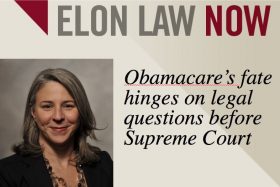In this week's "Elon Law Now," Prof. Catherine Ross Dunham provides analysis of the legal issues in the Supreme Court case that will determine the fate of the Affordable Care Act.

“In the King v. Burwell case, the challengers argue that the plain meaning of the statutory language ‘an exchange established by the state’ limits the availability of health care subsidies to only those states which have state-based exchanges. On its face, this is a strong argument and worthy of the Supreme Court’s consideration. However, the plain meaning rule yields if the Court determines the language is ambiguous. An ambiguity can relate to the language itself, its context, or even to its application within the operation of the statute. The proponents of the ACA argue the language is ambiguous in the context of the statute and in the application of the ACA, thus the Court should go beyond the plain meaning of the words ‘an exchange established by the state’ in interpreting the ACA language.”
——————–
Dunham’s extended commentary and analysis of the legal issues in King v. Burwell follows:
“On March 4, 2015, the United States Supreme Court heard arguments in King v. Burwell, the second substantial challenge to the Affordable Care Act. The first challenge to the Act in 2012, when the Act was challenged by 27 states, argued unsuccessfully the Act itself was unconstitutional. The King challenge, put forth by only seven states, addresses the actual meaning of six words in the over 1000 page Act. Those six words form part of the section which provides that people who cannot afford health care will have subsidies available through ‘an exchange established by the state.’ The ACA allows states to set up their own health care exchanges and further provides that if a state decides not to set up their own exchange, the federal government will operate an exchange in states where no state exchange exists, thus allowing all citizens access to affordable health care. The seven states now challenging the Act argue that the language ‘an exchange established by the state’ limits the availability of health care subsidies to those persons who live in a state with a state-based exchange. The effect of the challenger’s interpretation would be to eliminate subsidies in the 34 states using the federal exchanges, creating a two-tier system of dividing ACA participants between those persons in states with state-based exchanges, who will receive subsidies, and those persons in states with federal exchanges, who will receive no subsidies. Thus the impact of the challenger’s interpretation of those six words would undermine the overarching goal of the ACA and could effectively dismantle the entire program.
“The meat of this argument centers on something lawyers know well and deal with often – the rules of statutory construction. In our three branch system of government, the judiciary serves the role of interpreting Congress’s statutes when questions arise as to the meaning of those statutes. The courts have established rules for statutory construction and follow established precedent regarding how the constructs of statutory interpretation are applied. The starting point of any statutory interpretation argument is known as ‘the plain meaning rule’ which provides the Court look first to the plain meaning of the statutory text to determine the construction of statutory language.
“In the King v. Burwell case, the challengers argue that the plain meaning of the statutory language ‘an exchange established by the state’ limits the availability of the health care subsidies to only those states which have state-based exchanges. On its face, this is a strong argument and worthy of the Supreme Court’s consideration. However, the plain meaning rule yields if the Court determines the language is ambiguous. An ambiguity can relate to the language itself, its context, or even to its application within the operation of the statute. The proponents of the ACA argue the language is ambiguous in the context of the statute and in the application of the ACA, thus the Court should go beyond the plain meaning of the words ‘an exchange established by the state’ in interpreting the ACA language.
“In these arguments, the proponents rely in part on a 1984 case, Chevron v. Natural Resources Defense Council, that created something termed Chevron deference which provides that when statutory language in an agency-administered law is ambiguous, the court shall defer to a permissible interpretation based on the ‘wisdom of the agency’s policy.’ The premise behind Chevron deference is that the agency, to which Congress has delegated policy-making responsibilities, is in a better position than the Court to evaluate the administration of the statute in the context of everyday realities. In Wednesday’s arguments, Justice Kagan stated from the bench that in statutory interpretation ‘context matters,’ leading many to speculate that Chevron deference might play a role in the Court’s interpretation of the ACA.
“King v. Burwell is an extraordinary statutory construction case not only because it deals with a politically controversial Act but also because the implications of how the language is interpreted affects citizens in 34 states who cannot otherwise afford health care. In oral arguments, the Justices expressed concern that an interpretation that provided subsidies only to citizens in states with state-based exchanges will coerce states without exchanges to establish state-based exchanges, sending the state’s health care systems into a ‘death spiral.’ The issue of coercion brings forth questions about the Act which center on ‘cooperative federalism,’ the term used to describe laws which require the federal and state governments to work together. This issue is beyond the focus of this short commentary but it is an important issue in the Robert’s Court and will assuredly play a part, whether implicitly or explicitly, in the Court’s decision in King.”
More information about Elon Law Professor Catherine Dunham is available here.


